|
|
|
Sort Order |
|
|
|
Items / Page
|
|
|
|
|
|
|
| Srl | Item |
| 1 |
ID:
148477
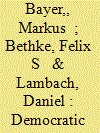

|
|
|
|
|
| Summary/Abstract |
Research suggests that nonviolent resistance (NVR) campaigns are more successful in deposing dictators than armed rebellions. However, ousting dictators is only the first step in the process of democratization. After deposing an autocratic regime, societies enter a transition phase where they must learn to consolidate the gains of democracy and bargain about the new rules of the democratic regime. But even if free, fair, and competitive elections are held, indicating a successful transition to democratic rule, uncertainty about its stability remains salient. In the period that follows, either democracy survives and proves to be resilient, or an autocratic backslide occurs. In this article, we analyze the effect of NVR campaigns on the survival of democratic regimes. Building on the literature on modes of transitions and nonviolent resistance, we argue that those democratic regimes that come into being as a result of a NVR campaign are less prone to democratic breakdown. The main mechanism which produces this effect is that the organizational culture of NVR campaigns spills over to the subsequent democratic regime fostering conditions favorable for democratic survival. We test the effect of NVR campaigns on democratic regime survival using survival analysis and propensity score matching. The results show that democratic regimes that experience NVR during the transition phase survive substantially longer than regimes without NVR.
|
|
|
|
|
|
|
|
|
|
|
|
|
|
|
|
| 2 |
ID:
148478


|
|
|
|
|
| Summary/Abstract |
As a fundamental concept in peace research, trust, or the lack of it, has shown to be associated with the onset of violent conflict, the instability of negotiated settlement, and the sustainability of peace. Despite its proven importance, the question of how political trust can be built after civil conflicts has only received limited attention and remains unanswered. While previous studies demonstrated that improved provision of public services plays a significant role in a trust-building process, the present article shows a more nuanced picture, namely that service enhancement only works if it reflects the needs of people. Projects that do not properly mirror the needs of people, however, have no direct effect on building political trust. Using micro-level data from Sierra Leone, the article finds that people are more likely to trust governments that are willing to listen and respond to their needs and demands. Though government performance carries the previously hypothesized effect, its explanatory power reduces substantively once responsiveness is introduced into the analysis. This finding also holds when potential biases due to endogeneity and sample selection are considered. Results from a mediation analysis also indicate that if government performance has any effect, it is transmitted through the responsiveness mechanism. Overall, this article contributes to the literature by clarifying the mechanism of trust-building in post-conflict societies.
|
|
|
|
|
|
|
|
|
|
|
|
|
|
|
|
| 3 |
ID:
148482
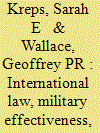

|
|
|
|
|
| Summary/Abstract |
Despite the increased emphasis on domestic politics in the study of international law, scholars remain divided about whether and how international law affects domestic institutions. Moreover, while public support is a core ingredient for sustainable, legitimate policies in a democracy, research at the individual level of analysis remains limited. Weighing in on these areas of study, we investigate the use of drone strikes for counterterrorism, a subject of considerable debate. Proponents in the government point to drones as both effective for disrupting terrorist networks and compatible with international law. Critics from groups such as international organizations (IOs) and nongovernmental organizations (NGOs) respond that attacks create more terrorists than they kill and violate legal commitments. The central question we ask in this article is whether these international legal criticisms impact public support for drone strikes, the centerpiece of US counterterrorism policy, or whether individuals are more persuaded by effectiveness-based arguments. Employing a survey experiment of a nationally representative sample of the United States, we find IO and NGO criticisms can shape public attitudes even around an important national security issue like drone strikes, but are most influential when messages center on legal critiques rather than matters of effectiveness. Our findings speak to fundamental questions about the domestic politics of international legal commitments, the role of IOs and NGOs in shaping political debates, and the durability of US counterterrorism policy.
|
|
|
|
|
|
|
|
|
|
|
|
|
|
|
|
| 4 |
ID:
148479


|
|
|
|
|
| Summary/Abstract |
This study explores the local effects of internal armed conflict on postwar violent crime in Northern Ireland. It argues that exposure to wartime violence will lead to higher levels of violent crime in the aftermath of conflict. Particularly, it claims that exposure to violence committed by armed groups challenging the state (anti-government groups) will have this effect, as it erodes the legitimacy needed for local law enforcement agencies to function effectively. This, in turn, is expected to contribute to the emergence of a postwar public security gap that lowers opportunity costs to resort to violent crime for a range of local actors. To evaluate these propositions, spatial statistics on a subnational dataset covering war-related fatalities for the period 1969–98 and police crime records for the postwar period 2002–06 are employed. The results indicate that the more an area has been exposed to violence, and the larger the proportion of this violence committed by anti-government groups, the more violent crime on the local level. This study hence contributes both to the burgeoning literature on the legacies of civil war and to recent research emphasizing the need to disaggregate non-state actors.
|
|
|
|
|
|
|
|
|
|
|
|
|
|
|
|
| 5 |
ID:
148476
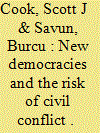

|
|
|
|
|
| Summary/Abstract |
Existing theories of regime transitions suggest that new democracies are more prone to political violence than consolidated democracies. We contend that this risk varies based on the political legacy of the new regime. Specifically, we argue that the prior authoritarian regime influences the risk of conflict in new democracies by shaping the nature of the post-transition political environment. In democracies following military rule, the former autocratic leadership often remains an active political force in the new regime. The continued presence of a materially powerful opposition creates a division in the new regime, increasing the risk of conflict by: (i) complicating efforts to consolidate democratic rule and (ii) signaling potential political opportunity to would-be rebels. In line with our argument, we find that only those new democracies emerging from military rule are more likely to experience civil conflict compared with consolidated democracies. These findings have implications for democracy promotion and conflict prevention efforts, suggesting that democratization is not always associated with an increased short-term risk of conflict as is currently assumed.
|
|
|
|
|
|
|
|
|
|
|
|
|
|
|
|
| 6 |
ID:
148480
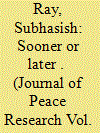

|
|
|
|
|
| Summary/Abstract |
A well-known finding in the literature on ethnic conflict is that new states are more prone to ethnic conflict than old states. What are less well known, however, are the mechanisms through which independence leads to ethnic conflict. This lacuna is surprising since the literature offers different mechanisms to explain the result, each pointing to very distinct policy responses. This article examines these mechanisms by analyzing variations in the time from independence until an ethnic group engaged in armed conflict in ex-British colonies using an original colonial legacies dataset covering 177 ethnic groups in 33 ex-colonies. My analysis reveals that the main group-level triggers of early conflict onset are perceptions of backwardness, exclusion from political power on the eve of independence, downgrading of political status in the immediate aftermath of independence, and being regionally based. More generally, I find that shorter durations of post-independence peace are better explained by subjective evaluations of group worth instead of rational assessments of the costs and benefits of mobilization. These findings indicate that power-sharing arrangements may be a sine qua non for stabilizing new states in divided societies since what is at play in these contexts are complex considerations of group status that cannot be accommodated by non-ethnic institutional arrangements.
|
|
|
|
|
|
|
|
|
|
|
|
|
|
|
|
| 7 |
ID:
148481


|
|
|
|
|
| Summary/Abstract |
We examine the strategic rationale for terrorist tactics in civil war. We identify conditions that favor terrorism as a tactic in armed civil conflicts as well as the specific targets as a function of rebel characteristics, goals, and government responses to political demands. Terrorist tactics can be helpful as an instrument to coerce the government in asymmetric conflicts, as rebels are typically weak relative to the government. But terrorism can also help communicate the goals and resolve of a group when there is widespread uncertainty. We consider the strategic importance and rationale for terrorism in terms of the frequency of attacks and specific targets, and analyze our propositions using new data linking actors from the Uppsala/PRIO Armed Conflict Data and the Global Terrorism Database. Consistent with our expectations, we find that terrorism is used more extensively in civil conflicts by weaker groups and when attacks can help the group convey its goals without undermining popular support. Groups with more inclusive audiences are more likely to focus on ‘hard’ or official targets, while groups with more sectarian audiences are more likely to attack ‘soft’ targets and civilians.
|
|
|
|
|
|
|
|
|
|
|
|
|
|
|
|
| 8 |
ID:
148483
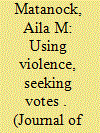

|
|
|
|
|
| Summary/Abstract |
In many cases, including some of the most destructive civil conflicts and some of the newest emerging democracies, militant and ex-militant groups form political parties to participate in elections. Despite the prevalence of such electoral participation, it has rarely been studied, and scholars have not explored its influence on outcomes such as conflict or democratization. A lack of comprehensive data has impeded this research. The dataset introduced in this article provides annual data on militant and ex-militant group participation in legislative elections between 1970 and 2010. The Militant Group Electoral Participation (MGEP) dataset allows for further empirical study of the patterns, causes, and consequences of this behavior. Moreover, in combination with other datasets, MGEP stands to provide additional insights on conflict, peace, democratization, and electoral politics more broadly. In this article, I describe MGEP, provide summary statistics on the data, and show its applications, including through a replication study on post-conflict elections.
|
|
|
|
|
|
|
|
|
|
|
|
|
|
|
|
|
|
|
|
|